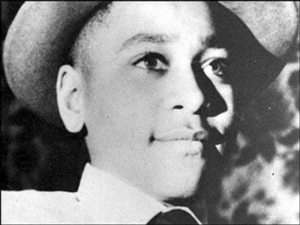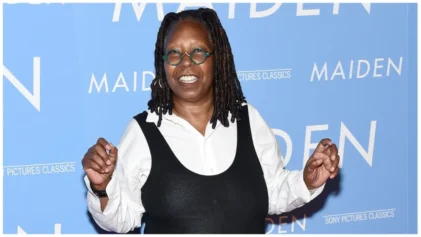
A few days earlier, on August 24, Till had walked into Bryant’s Grocery & Meat Market to purchase bubble gum. It’s alleged that Till, who had a stutter, spoke “inappropriately” to Carolyn Bryant, who was white, and breached a social more of the old south that to this day remains taboo. Four days later, on August 28, Emmett Till was kidnapped from the home of his great-uncle by Bryant’s husband Roy and his half-brother J. W. Milam. Till’s mutilated body surfaced on August 31, his eye gouged out, a gunshot through head. He was identifiable only by the ring he wore bearing the initials of his late father, Louis Till.
Emmett Till’s mother, Mamie Till Mobley, upon seeing what was done to her only child, made the decision to hold an open casket funeral in Chicago so “the world could see” and finally face the horrors of racism and lynching in America. Pictures of Emmett’s body were printed in Jet magazine and The Chicago Defender. Before long, the media image had circulated around the world.
For many, learning about the murder of Emmett Till and the subsequent trial, where an all-white jury acquitted Bryant and Milam, was a defining moment in their lives and their work. Rosa Parks said she thought of Till as she defied Jim Crow by refusing to leave her seat on a bus in Montgomery, AL in December of 1955. Martin Luther King, Jr. called Emmett Till’s death political, citing his murder as an intimidation tactic to keep African-Americans away from the polls that year. The Civil Right Act of 1957, was passed, in part, because of Till’s murder and A. Phillip Randolph and Baynard Rustin, in planning the March on Washington chose August 28, 1963 to commemorate the life of Emmett Till and spark a movement.
Today, 60 years after Emmett Till was murdered, his legacy is still inspiring the work of others, specifically Keith Beauchamp, who has teamed with Whoopi Goldberg and Frank Zollo (producer of Mississippi Burning and Ghosts of Mississippi), to tell the story in a feature film entitled, Till. Announced on Wednesday, Beauchamp, known for his acclaimed documentary, The Untold Story of Emmett Louis Till, says his journey in getting the feature film completed is “coming full circle.”
Beauchamp started working on Till 20 years ago. His screenplay was first optioned by Showtime in 1998, yet Beauchamp didn’t feel connected to the Showtime project in a meaningful way.
“Basically I felt like I gave my baby away,” he said.
Backing away from that option agreement, Beauchamp continued to study and research the Till case. While visiting the Mississippi Delta, where Till was murdered, Beauchamp was shocked to see how little things had changed since 1955.
“It felt like time stood still,” he remembers. “The most shocking thing was seeing blacks still living on plantations and in that type of poverty… it was a huge awakening for myself. Through that prism, I realized this was going to be an important story to tell.”
Beauchamp also found there was more to the Emmett Till story, and perhaps more people were involved in his murder than originally suspected. Armed with this new information, Beauchamp shelved the narrative drama and concentrated his efforts on producing a documentary that would expose the truth and tell the story in context of Tallahatchie County, Mississippi at the time in which Till’s murder occurred.
“Emmett Till was murdered a year after Brown, the Rev. George Lee was murdered just a few months before in Belzoni… then the murder of Lamar Smith two weeks before Emmett, in Brookhaven, shot in front of dozens of people in broad daylight,” Beauchamp says. “This was the door Emmett Till walked through, in what was called ‘the free state of Tallahatchie,’ where no one could come in, not the FBI, Department of Justice, no one. And the backdrop of what we saw in 1955 is what we are seeing today.”
The making of this film is the second phase of a promise Beauchamp made to Emmett’s mother, with whom he had a close relationship.
“I wanted to tell the story because somewhere along the way, we didn’t tell the story… others, Rod Serling, William Bradford Huie (who paid Bryant and Milam $4,000 in 1956 to confess how they murdered Till for Look magazine after they were acquitted), tried to get the film out from the time the murder occurred,” he says. “My documentary came out nearly 50 years later.”
Beauchamp’s 2003 documentary was instrumental in helping to execute phase one of the promise he made to Mamie, which was to get Emmett’s case reopened.
“Watching Mamie’s persistence, she worked for 40 years trying to get the case reopened… I wanted to help her.”
Mamie died of heart failure in 2003, before the case was reopened.
In 2004, the U.S. Justice Department reopened the case to determine whether anyone else was involved in the murder of Emmett Till based upon information contained in Beauchamp’s documentary. However, it was closed in 2007 to Beauchamp’s disappointment.
“I at least thought Carolyn Bryant (who is still alive and said to have been present when Till was kidnapped by her husband and brother-in law) should have been charged,” he says.
However, the reopening of the Till case gave way to The Emmett Till Unsolved Civil Rights Crime Act of 2008. The Emmett Till Act, as it is called, has helped a uncover evidence in the cold civil rights cases (those prior to 1970) and brought Beauchamp to a new phase in his own journey as host of The Injustice Files on Investigation Discovery. He knows that many of the families may not see legal justice, but he helps them to find “truth justice,” which is “what they really want…just to know what happened to their loved ones.”
With Till, Beauchamp felt that teaming with Zollo would be the best opportunity to tell the story “from the stance of the people who lived it.” Zollo worked with Whoopi Goldberg on Ghosts of Mississippi, where she portrayed Myrlie Evers, the widow of Medgar Evers. He says she is as passionate about producing the film as both he and Zollo are. They have been discussing the project for a number of years, though Beauchamp says, “the time wasn’t right until now.”
Like the murder of Emmett Till helped to launch a movement, Beauchamp hopes this film will do the same. He and his partners are launching the #MyEmmettTillMoment, urging people to share their first encounter with the Emmett Till story and the first time they saw the photograph of Till’s body. Beauchamp says building grassroots support is critical to the success of the film.
“I have been able to see the change in people when they tell me their Emmett Till story about the first time they remember hearing about it,” he says.
To continue to build on the grassroots movement, Beauchamp, Zollo and Goldberg have launched a Kickstarter page, which allows the public to have their own buy in to the making of the film. Till begins production in the winter of 2016. At least three other Emmett Till films are in development. Beauchamp thinks it is “exciting that all these other projects are happening.” As for who he wants to star in his film, he has his eye on Taraji P. Henson, star of Empire on FOX, to play Emmett’s mother, Mamie.
“I think she can really do this… she’s my first choice.”
With Till, Beauchamp is only concerned with telling Emmett Till’s story the way in which he promised Emmett’s mother he would so many years ago.
“Emmett Till is our Anne Frank,” he says. “The story is something that is cultural, to tell it wrong could impact the consciousness of many. I am obligated to tell it right… I promised Mamie.”


